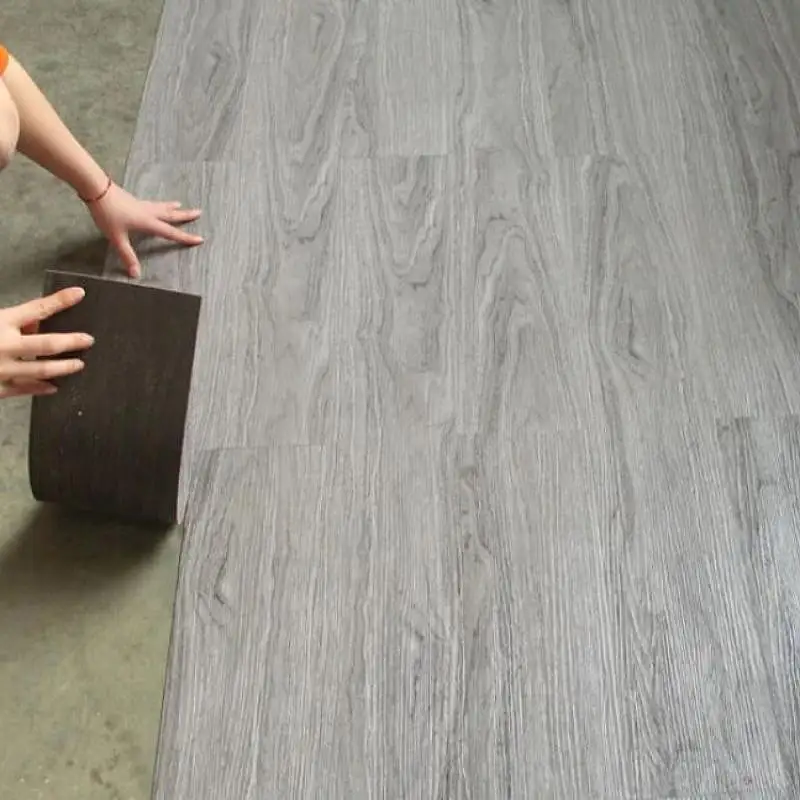Glueless vinyl flooring, especially click-lock or interlocking vinyl planks, offers several distinct advantages compared to various flooring materials:
- Ease of Installation: Glueless vinyl flooring is designed for easy installation without the need for adhesive. The click-lock or interlocking system allows the planks or tiles to snap together, making it a DIY-friendly option.
- Versatility: It can be installed over various existing flooring types, such as concrete, plywood, or existing vinyl, as long as the subfloor is clean, dry, and level.
- Moisture Resistance: Many glueless vinyl options are water-resistant or waterproof, making them suitable for areas prone to moisture, such as kitchens, bathrooms, or basements.
- Durability: Vinyl flooring is generally durable and resistant to scratches, dents, stains, and wear, making it suitable for high-traffic areas.
- Variety of Designs: Glueless vinyl flooring offers a wide range of design options, including various colors, patterns, and styles that can mimic natural materials like wood, stone, or tile.
- Low Maintenance: It’s easy to clean and maintain, typically requiring regular sweeping, vacuuming, or mopping with mild cleaners.
- Comfort and Warmth: Vinyl flooring can provide a softer feel underfoot compared to materials like tile or stone. Some options also offer underlayment for added comfort and warmth.
- Affordability: In comparison to some natural materials like hardwood or stone, glueless vinyl flooring tends to be more budget-friendly, offering a cost-effective flooring solution.
When considering flooring options, the distinct advantages of glueless vinyl flooring, particularly its ease of installation, durability, versatility, and moisture resistance, make it an appealing choice for many homeowners seeking a practical and aesthetically pleasing flooring solution for different areas of their homes.
How does polyvinyl glueless vinyl flooring to both commercial and residential environments?
Polyvinyl glueless vinyl flooring can be suitable for both commercial and residential environments due to its versatile properties:
Residential Environments:
- Durability: In homes, glueless vinyl flooring can withstand daily wear and tear, making it ideal for high-traffic areas like living rooms, kitchens, and hallways.
- Moisture Resistance: Its water-resistant properties make it suitable for bathrooms, laundry rooms, and basements where spills or moisture may occur.
- Easy Maintenance: Homeowners appreciate its low maintenance requirements, as regular sweeping, vacuuming, or damp mopping is usually sufficient for cleaning.
- Aesthetic Options: Available in various styles, glueless vinyl flooring colors, and patterns, including options that mimic natural materials like wood or stone, providing homeowners with versatile design choices.
Commercial Environments:
- Durability in High-Traffic Areas: In commercial settings like retail spaces or offices, polyvinyl glueless vinyl flooring can endure heavy foot traffic without significant wear or damage.
- Ease of Installation and Replacement: Its click-lock or interlocking system facilitates quick installation and, if needed, replacement of individual planks or tiles, minimizing downtime in commercial spaces.
- Hygienic Properties: Some vinyl flooring options feature antimicrobial or easy-to-clean surfaces, making them suitable for healthcare or food service settings where cleanliness is crucial.
- Moisture Resistance: Certain vinyl flooring varieties are waterproof, which is advantageous in commercial spaces prone to spills or moisture, such as restaurants or entryways.
While polyvinyl glueless vinyl flooring offers benefits for both residential and commercial spaces, the specific choice within these environments might vary based on factors such as the level of foot traffic, maintenance requirements, design preferences, and the need for additional features like water resistance or antimicrobial properties.
